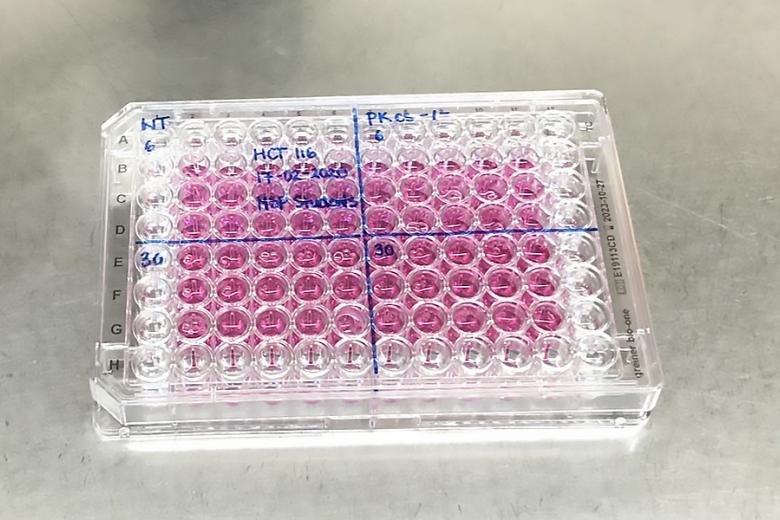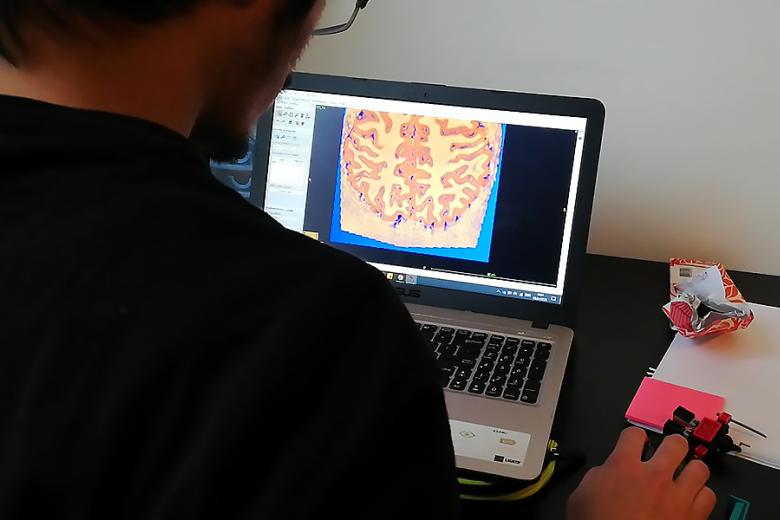Honours programme
Besides the educational structure of conducting research we encourage exceptional students to take a step further. Students can apply for the honours programme where you van experience research at first hand guided by experts in the field. And in exceptional cases, BTR thesis can lead to publications.
Lynn Scherpe
The Honours Research Programme (HRP) is a great opportunity for students in the MSP community to get involved in present significant scientific research.I started my HRP under the supervision of Professor Gabriel Paiva Fonseca at the MAASTRO Clinic in September 2019.
The MAASTRO clinic works collaboratively with the Radiology department of the Faculty of Health, Medicine and Life Sciences at Maastricht University in order to better understand the basic mechanisms of treatment failure in cancer patients. Together with two other MSP students, we began a project with the overall goal of improving cancer radiotherapy treatment. More specifically our research focused on examining the effects numerous distinct experimental and computational parameters have on cancer cell survival. In the experimental part of the project, we learned how to monitor and split cell cultures and perform clonogenic assays. We learned how to construct irradiation plans using the software SmART-Plan. Lastly, we used the program TOPAS nBIO to make computational irradiation simulations, where we examined how varying specific parameters, such as the beam energy, affects cancer cell survival.
The Honours Research Programme is a great opportunity for students in the MSP community to get involved in present significant scientific research.
The reason I applied for this programme is because I wanted to challenge myself and experience what it is like to work on a long-term research project. I am interested in pursuing a career in medical research and for this reason thought that this programme and specific project would grant me the opportunity to not only gain work experience, but also get a sneak peek into what it would be like to work at a medical institute, with a team of researchers from distinct backgrounds and fields. This project has an enormous impact on the vast majority of humanity, as globally cancer is currently the second leading cause of death. The results of this project have the potential to improve the treatment plan of the millions of individuals suffering from this condition, by optimising the particle type and parameters used during radiation treatment.
At times it was a bit challenging to manage the honours programme work alongside the regular university workload, but at the end the hard work and effort pays off because not only are you working on relevant research that can affect the health and lives of millions, but you are also gaining experience and learning things you do not learn in your regular university classes. For instance, through the HRP I got to experience what it is like to work in a professional work environment, gain a large number of practical skills and better understand the importance of communication and collaboration. Research is usually conducted in a group of people, as this allows researchers from different fields and specialties to come together. In our research group, we have chemists, biologists, and physicists and by working together we not only help each other but learn a lot from one another.

Kabir Arora
I chose to come to MSP because after high school, I didn't have a specific scientific discipline in mind that I wanted to pursue, only a couple of broad fields that I thought might interest me.
I chose to participate in the honours research programme partially to determine whether a research career in one such field was a good fit for me, and to strengthen my suitability for research degrees in the future by gaining first-hand experience in a research environment. I chose to do my research on fMRI analysis at the Maastricht Brain Imaging Center (M-BIC). Now, towards the end of my programme, I can confidently say that I'm glad I made the choice to sign up!
Alongside my supervisor Laurentius Huber, I work as part of a project on layer fMRI (functional Magnetic Resonance Imaging). fMRI is a widely-used, powerful tool to study the function of the human brain non-invasively. As the spatial resolution of fMRI improves to the sub-millimeter level, new challenges relating to image analysis are popping up, and must be addressed before improved image resolution can consistenly and effectively be used to study brain activity at the sub-cortical level, i.e., across cortical layers. The research group makes use of the high-field MRI machines available at M-BIC to implement new methods aimed at solving such challenges.
All the experience and technical knowledge I've gained has made the significant amount of time I've devoted to the project worthwhile.
It's been a lovely journey for me across the full year and a half. At the beginning, I was a bit clueless in terms of the theoretical concepts and software involved, but the patience and constant guidance of my supervisor helped steer me in the right direction. Towards the end, I was able to handle certain aspects of my project tasks far more independently than I could at the beginning. I was also able to experience the scientific publication and review process from start to finish. All the experience and technical knowledge I've gained has made the significant amount of time I've devoted to the project worthwhile. It has also allowed me to develop my interests and identify the field I feel most drawn towards, allowing me to go on with my academic career.

